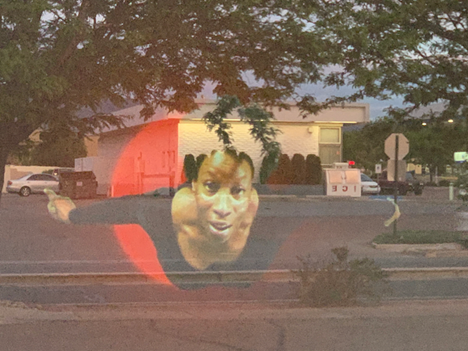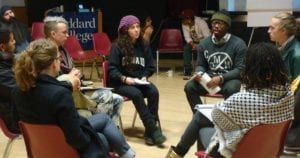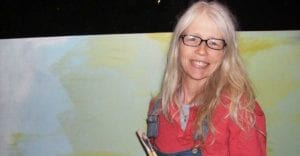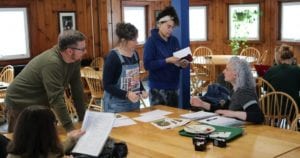 Other than the words to say hello, goodbye, let’s go, and the words for light, window and, for some reason, pencil sharpener, the Spanish I learned a thousand years ago in high school is lost to me.
Other than the words to say hello, goodbye, let’s go, and the words for light, window and, for some reason, pencil sharpener, the Spanish I learned a thousand years ago in high school is lost to me.
English is the only language I comprehend, speak, read and write. As a writer, as a reader, as a human being, it makes me sad and a little ashamed that my tongue and ears (and to some degree my imagination) are landlocked, cut off from the sea of the world’s other languages.
I’m not unique in my American monolingualism. But, as a writer, as a reader, as a human being, I mourn alone that I can’t read literatures written in other languages. I read works in translation—fiction, memoir, drama—because I must. But I draw a petulant line at poetry: a translated poem is a death mask, an elegy to the poem lost in translation.
A few weeks ago, seduced by the design of its chalk-on-blackboard cover, I bought a book: Literature Class, the Argentine writer Julio Cortázar’s lectures on literature and the mysteries of writing delivered at UC Berkeley in 1980, translated from the Spanish by Katherine Silver.
And way leads on to way…
Soon, I was reading one of Cortázar’s collections of fabulist short stories, Todos Los Fuegos el Fuego (All Fires the Fire), reading, as I often in translation do, in a trans-state of feeling: gratitude for the stories brought from Spanish into English; soft despair over what had been lost in the journey… that small suitcase with its worn handle left on a street in Buenos Aires.
I wanted to open the valise of what could not make the trip into English. I wanted to hear Cortázar’s voice, the author speaking the language in which he wrote. On YouTube I found an audio recording of Cortázar reading “Toco Tu Boca” (“I Touch Your Mouth”), chapter 7 of his masterpiece novel Rayuela (“Hopscotch”), which I share with you, here: https://m.youtube.com/watch?v=gOcPsaYXk24 … listen through ear- or headphones, if you can.
Then I found the original Spanish text and “read” it as I listened to Cortazar’s voice. I traced the words, their shapes on the page, by the sounds his mouth made. And each time I listened and “read” along, more pieces of my high-school Spanish returned to me: flowers, silence, moon, water—came within reach once again, as I floated in a sea of mysterious and exquisite human sounds…

Toco tu boca, con un dedo toco el borde de tu boca, voy dibujándola como si saliera de mi mano, como si por primera vez tu boca se entreabriera, y me basta cerrar los ojos para deshacerlo todo y recomenzar, hago nacer cada vez la boca que deseo, la boca que mi mano elige y te dibuja en la cara, una boca elegida entre todas, con soberana libertad, elegida por mí para dibujarla con mi mano en tu cara, y que por un azar que no busco comprender coincide exactamente con tu boca que sonríe por debajo de la que mi mano te dibuja.
Me miras, de cerca me miras, cada vez más cerca y entonces jugamos al cíclope, nos miramos cada vez más de cerca y los ojos se agrandan, se acercan entre sí, se superponen y los cíclopes se miran, respirando confundidos, las bocas se encuentran y luchan tibiamente, mordiéndose los labios, apoyando apenas la lengua en los dientes, jugando en sus recintos donde el aire pesado va y viene con un perfume viejo y un silencio. Entonces, mis manos buscan hundirse en tu pelo, acariciar lentamente la profundidad de tu pelo mientras nos besamos como si tuviéramos la boca llena de flores o de peces, de movimientos vivos, de fragancia oscura. Y si nos mordemos el dolor es dulce, y si nos ahogamos en un breve y terrible absorber simultáneo del aliento, esa instantánea muerte es bella. Y hay una sola saliva y un solo sabor a fruta madura, y yo te siento temblar contra mí como una luna en el agua.
I have shared the audio of Cortázar reading “Toco Tu Boca” with a few special friends, none of whom speaks Spanish, at least not well. “You were right about the Cortázar piece,” Spencer, a young poet, responded in a text. “Now I’ll have to find it in writing.”
And as we walked together in the park in bright morning light, I played “Toco Tu Boca” on my phone for Barbara. “What language was that?” she said, knowing full well, and shook her head for the beauty of the words, for the sound of the author’s voice, and said, “My god.” And we walked on, along the path in the shadow of the leaves, and talked then about the color of the sky and the way the wind through the leaves spoke like the sea.







